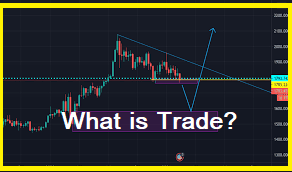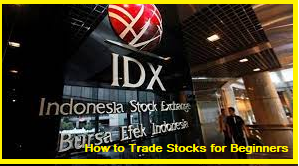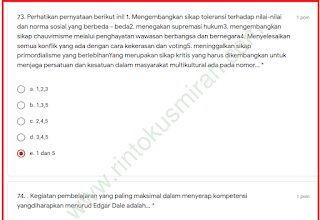Rintokusmiran.com | What is Trade? - The term "trade" is currently under discussion by many people. The reason is that more and more young people are getting rich recently due to the fact that they are playing in the commercial sector. Then what is trade?
This is what makes a lot of people look at this single tool. However, before deciding to spend money on trading, it is recommended that you know what trading is in advance so as not to run out of money, because it is known that this tool has great risks.
What is trade?
Trading is the process of long-term financial transactions, or the term is a business in the form of currencies.
 |
| What is Trade? |
In the financial market, trading is an important tool because it can generate large amounts of money. However, to make the most of your profits, you must read the market movements well.
In general, commerce is a basic economic concept that includes the buying and selling of goods and services. That is, the buyer will pay compensation to the seller or in the exchange of goods or services between the parties.
LINK TRYOUT PPPK TAHAP 2 BERSAMA RINTO KUSMIRAN BAGIAN 9
Thus, trade can be completed as an exchange of goods for money. Trading in the financial markets themselves refers to the buying and selling of securities.
As with any instrument, trading aims to make money by selling an asset at a lower price than it was paid for.
To profit from trading, traders must monitor prices from time to time and look for patterns to predict future prices.
Trade types
To understand more about trading, there are a number of different types of trading in the financial markets. Here are some of them:
1. Stock trading
Stock trading is the ownership of shares in a public company that is sold to the public through a stock broker. Investors can benefit if the company increases its profits.
Simply put, stock trading is the buying and selling of stocks over a period of time, but most are short.
To profit from stock trading, you must make the right decisions. This means knowing when to buy and sell, and knowing the movement of price fluctuations.
2. Forex trading
Forex trading is a type of trading in which the currency of one country is sold for the currency of another with the participation of the main foreign exchange markets of the world, which takes place around the clock.
It should be noted that the participants in the forex market are not only a few, but also several institutional or non-institutional parties.
3. Commodity trading
In the commodity market, the company compensates for its future risks when buying or selling natural resources.
For example, if at that time only precious items such as oil or precious metals could be traded physically, now you can buy and sell them online and you can profit from trading these commodities.
To get the most profit, you can open a buy position when the price is low and sell it again when the price is high.
The difference between trading and investing
Some people still do not know the definitions of investing and trading that can increase your wealth. But both have different definitions of understanding. The meaning of both is explained below.
Investment is defined as the infusion of funds by investors in order to accumulate assets and generate profits in the future.
Whereas, a trader is a person who invests in order to make a profit by taking advantage of price changes in a short period of time.
To better understand investing and trading, here are the main differences you should know:
1 The buy-and-hold principle. This means that investors are investing in stocks of companies that are healthy and have good fundamentals. Therefore, investors do not care about price changes. Buying and selling is where investors or often called traders invest their money in buying shares of a company when the share price may go up in the near future. So I focused on price changes.
2 Strategy: Buy shares of a well-founded company. Buy stocks of companies that have an upward potential in the near future.
3 short term
Read also: Investing is a way to grow wealth, follow these tips to make maximum profit!
Building wealth by doing business
Trading can really bring in rupees treasury, provided you have the ability to read market movements well. Article - Commodity
Yes, trading is also known as high return and high risk, which means that the profit and the risk are equally high.
Knowing this, many traders use their profits by moving into the business sector to increase their wealth.
However, you still need to be careful when choosing a promising business sector that can generate significant returns, one of which is doing business in the education sector.
According to educational SMEs, they understand that education business is the right choice for business because education will never die, including Pak Yahto Devi Hosudo as the owner of PT Ambale.
“When many entrepreneurs face hurdles during the pandemic, my business is really growing because schools still need products or services to support learning. My sales have risen to more than 5 billion rupees,” Pak Yahto said.
Furthermore, Pak Yahto admitted that he focuses solely on finding sellers and improving the quality of goods and services sold. Meanwhile, to expand his business, he admitted that he relied on Pintek for funding.
“Pintec really helped me with the financing issues I was having. The loan limit is big, the application process is simple and the repayment is very fast. Thank you, Pintek, for making my dream come true as an entrepreneur,” said the man known as Dodo.
So, from the trading profits you earn, you can start an educational business and grow your business by partnering with Pintek to earn additional trading capital.
To get financing from Pintek, you can apply for SIPLah Order / Invoice Funding Products and Purchase Order / Invoice for SMEs playing SIPLah, LPSE or LKPP or e-catalog.
Also Read: LPSE Is The Solution For Small & Medium Business Growth, Here's The Complete Guide To The List!
Interestingly, you have the option of obtaining financing ranging from 50 million rupees to 1 billion rupees simply by providing a current account from the customer.













